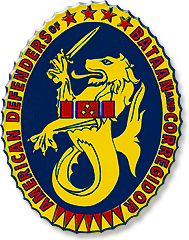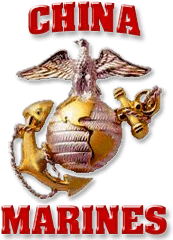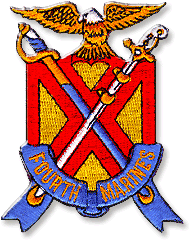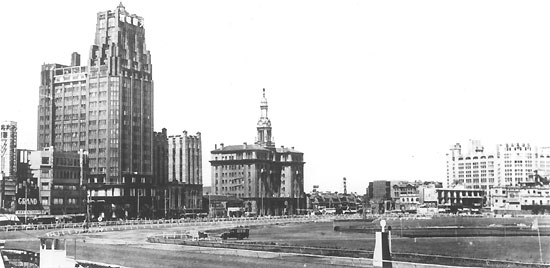|
CHAPTER
ONE - China Duty
Anyone attending the Sunday band concerts by the 4th Marines Band
stationed in Shanghai, China at the beginning of the 1940’s, discovered
quickly just how popular the band really was. It played to full houses
following church services at the Grand Theater every Sunday morning.
These services and the band concert immediately following, was one of
the great steps of America’s examples of putting its best foot-forward
in Far East relations. They added great class to our presence there for
the culture it brought and added to the community. There were plenty of
negative aspects to it, but Marines contributed greatly in positive
ways in colorful ceremonies, sports, spiritual examples and very
greatly with the weekly band concert open to the public. And the public
loved it.
Until the Peking (Beijing) Legation Guard Band stationed in North China
was evacuated from there to Shanghai in the spring of 1941, the
Fourth’s band was a 25 piece aggregation not counting the trumpeters
and drummers ( Field Musicians) assigned to the battalions. The
combination made it one of the larger field bands in the Corps for a
short time, It’s leader during that time was Master Technical Sergeant
August Olaquez. When he and others who had completed their usual three
year tours of duty on the Asiatic station were returned to the States,
the band and drum corps numbered forty eight musicians, it was this
group that I called “The Last China Band”, This is the story of it’s
last days before it was integrated into an infantry battalion and met
its end on the island of Corregidor in Manila Bay 10 May of 1942.
The most memorable concert and church service was
on 20 October 1940 with Navy Lieutenant B. F. Trump officiating. We had
arrived on the station in the same famed vessel, the USS Chamont, a
navy transport ship. PFC Arnold Baker, ‘first chair’ horn had persuaded
bandmaster Giffin to let his horn section play special music and
somewhat reluctantly allowed it to happen. Baker, PFC Anthony
Stankitis, the second chair, with me on third, worked up a great
sounding trio of a sweet tune called “In The Gloaming” by Harrison. In
a shower room that had wonderful acoustics adjacent to Giffin’s
quarters, it sounded great and so we put it on the program to play
during church services. After we marched up front in our freshly
pressed dress blues, brought ‘em up and played only the first two bars,
both Baker and Stankitis were stricken with dry mouths. Both of them!
This left Private Donald Versaw playing away at his 3rd horn part and
sounding like he didn’t even know what song was to he played. I looked
in desperation at bandmaster Giffin who quickly cued in PFC Kenneth
Marshall who picked up the melody and the trio quickly changed to a
Clarinet and horn duet with an occasional dry toot from the other two.
I can only say I believe that “Reefs” Baker and “Stinky” Stankitis had
been stricken with terminal stage fright. It was not like them at all.
It would have been more like something I would do being the young, dumb
kid I was. The experience did not do well for the horn section and we
were never allowed to even think about performing special music at
church again. I feel sure the Lord did forgive us though, even if
Bandmaster Giffin may never have. The concert that followed did redeem
the band however; we played a rousing Barn house march, Harmony Heaven.
That alone was surely atonement. After that we played the Overture to
Rossini’s “Barber of Seville” and I seem to recall that I tried very
hard to be heard playing my part in case the other horn players were
still undone. The dessert for the concert was a fantasy number called
“Woodland” by Ladeu and, as always, we finished the concert standing to
play the Marines Hymn and the National Anthem. It was a concert that I
shall never forgot.
During these last months of service in Shanghai, the possibility of war
spreading to the Far East increased in likelihood day by day. The
English newspaper and radio station continually reported items that
reflected the tensions in and around the bulging, refugee-swollen
metropolis of Shanghai. There were thousands of people from Europe
driven out by the Fascists, Nazis from the conflicts currently in
progress there. A whole community of Russian people and its next
generation of kids pushed out of their country during the red revolts
years before. Then there were literally millions of very poor and
desperate folks from all parts of China affected by the Japanese
aggression underway since 1937. The International Settlement was then
like a small Montenegro and it was a strain on everyone. It was a place
filled with people without hope or help and they died by the score
everyday. Every morning their bodies were gathered up and taken away.
Most died of starvation or the diseases related to it, but some were
just murdered. The most common reason for that was terrorism.
The Chinese government hired thugs and criminals to bomb and burn in
the Japanese defense sectors, and the Japanese hired others to bomb and
burn in the American, British, and Shanghai volunteer sections. The
French Concession may have had the least trouble about that but I’m not
sure about it.
The Fourth Marines had a golf club. To play the only course available
it was necessary to pass through a Japanese defense sector in our
trucks to a place called HUNG JAO. A permit had to be arranged for in
advance each time. Golf and any other individual sport participation
were scheduled for every Wednesday afternoon. It was all called
“Organized Grab Ass”. It could be that was a universal thing in the old
Corps. We had it in San Diego. The deal was that following noon mess,
each Marine or groups of Marines takes the rest of the day and, on
their honor, participate in one or more active sports. it was just not
proper to take off, go ashore on liberty and do as you might any other
day. Anything was okay as long as it was some active recreational sport
like, swimming, handball, tennis, and golf perhaps. Just no chess,
elbow bending in the nearest gin mill, or the like.
The Marines that played golf did get to observe some of what Japanese
forces were doing in part of occupied China outside the city. One of
their most interesting reports was watching their progress constructing
a prison camp in HUNG JAO. We talked about our chances should the
Japanese invade the International Settlement, take it over and toss us
all into a “Concentration Camp.”
Someone asked Bandmaster Giffin what he would do if he ever became a
prisoner of war and a Japanese guard ordered him to shine his boots.
Giffin replied, with a wry smile, “I guess I would just get down there
and shine like a ‘bastard”. More talk had to do with what food we might
get and of course “fish heads and rice” was always the first guess one
would make. Ironically when it really happened that didn’t happen.
Sometimes there was rice but rarely any fish in any form.
Note: Arnold Baker returned to the States before the band was lost in
the Philippines. He rose to the rank of major in another field and
served many years as president of the School Board in one of the
largest districts in California.
I arrived at Shanghai during the same month that divine services and
concert were conducted at the Metropole Theater. Chaplain, Navy
Lieutenant H. R. Markham, was in charge for his farewell sermon and the
Band played a program of all Oriental style music. During church
services Shanghai’s “Crescendo Society”, a 50 voice choir led by
Professor Chao Mei-Pa, performed several selections among which was
“Canon Symphonicbus” sung in Latin. The program selected for the band
concert by Master Technical Sergeant Levis E. Giffin, began with a
march entitled “Pride of the Orient” by Venuto, followed by “Chinese
Danse” by Crist. A selection often played by the band followed with ‘In
A Chinese Temple Garden” by Ketelbey. This last number was one of my
favorites and I enjoyed playing it with the band. It was however soon
partially replaced in my recollections with ‘Shina No Yoru” (China
Night), a song popular with the Japanese, but still kindles warm
memories of service in China.
|
|
I know of no reason why the site of band concerts
and church services were moved to the Grand Theater opposite the great
Race Course and now The Peoples Park. It was a much larger theater.
From the first concert the band played there, after I became a member,
it was always filled. It was a newer more modern venue as evidenced by
seats fitted with headphones on which could be heard translations in
Chinese. It is doubtful that the excellent lounge just off the foyer,
and always open for business, had anything to do with the selection of
the place. The fact that a short period following rehearsals before
performances was convenient for those who needed a bit of “hair of the
dog” treatment, probably had nothing to do with it either. I found a
touch of a little Scotch and Soda did lubricate the valves of my French
horn well and made it sound better. I thought it did, at least to me.
It could have been that the Grand Theater was rather unique in some
respects. No more so perhaps than the rifle range operated by the
Shanghai Volunteer Corps and where Marines fired small arms for annual
qualifications and matches. it was the only rifle range I ever heard of
where beer and wine could he purchased from a cart on the end of each
firing line. Now I am positively sure that all Marines who were ordered
to fire the range were absolutely forbidden to visit the cart at any
time. The facility may have been made available for those people born
drunk but had to drink booze to get sober. I’ve always thought that I
would have been a better shot if I could have had one or two before
trying to screw myself into one of those rubber-man killing,
contortionist breaking, shooting positions with a 1903 Springfield
service rifle.
Sorry to have digressed here, because it is well to recall and record
that band concerts at the Grand Theater were indeed some of the most
grand events of being a bandsman then. The pride I had to take my place
in the horn section of that great stage, was almost as great as that I
felt when our drill instructor Sergeant Bob Pender said, You now can be
called A MARINE! less than a year earlier.
|






